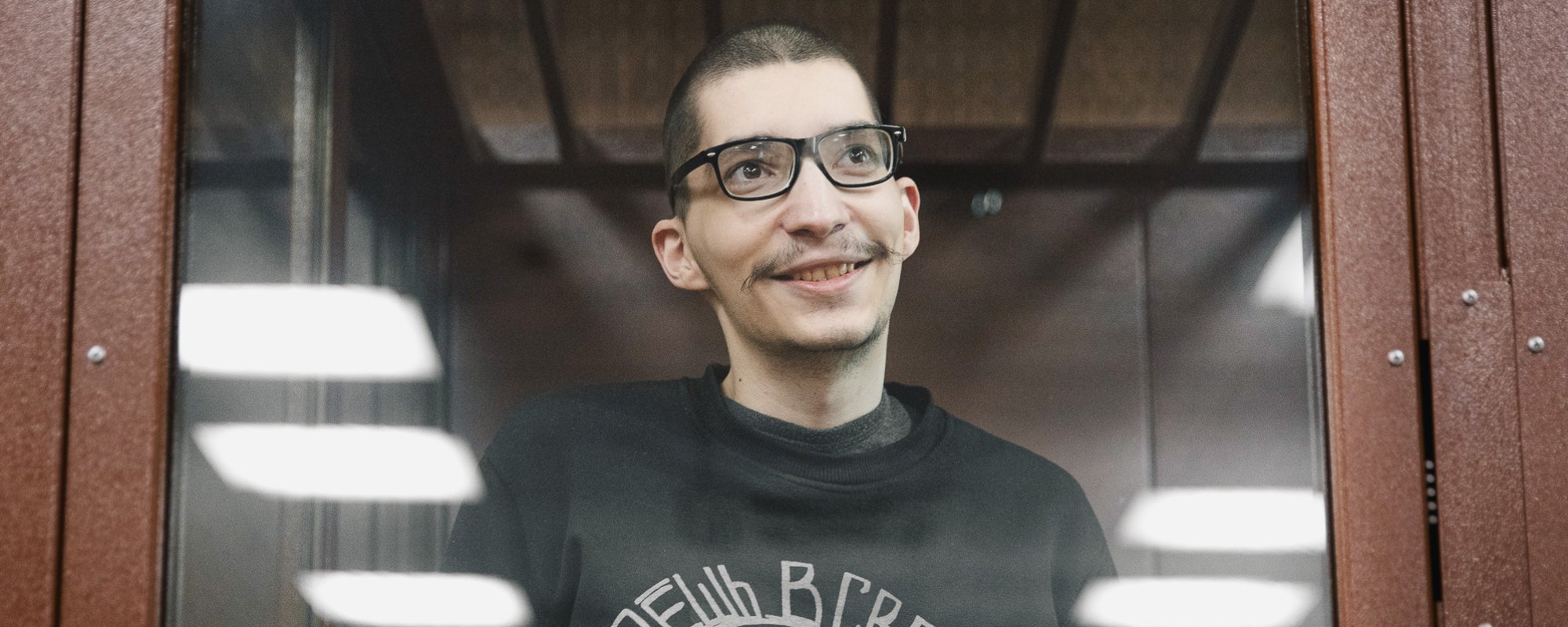Chechen warlord’s son brutalises a prisoner on camera. New detentions for donating to Navalny and election interference — here’s the key political repression news for September.
The Article on «Insulting Religious Feelings»
One of the most high-profile events of September was the release of a video showing the son of Chechen leader Ramzan Kadyrov, Adam, assaulting Nikita Zhuravel. Zhuravel is a Volgograd resident who has been in pre-trial detention since May for burning the Koran. Shortly after his detention, the Investigation Committee transferred Zhuravel’s case to Chechnya, referring to «numerous appeals from residents of the Chechen Republic with a request to recognize them as victims.» Initially, the case was brought under the article on insulting religious feelings (Article 148 of the Criminal Code), but when the case came to court, it became known that the young man was also charged with the article on hooliganism motivated by religious hatred (Part 2, Article 213 of the Criminal Code).
In August 2012, Pussy Riot members Nadezhda Tolokonnikova, Maria Alyokhina and Ekaterina Samutsevich were convicted under the same article — part 2 of article 213 of the Criminal Code. The reason was a «punk moleben» (supplicatory prayer) «Mother Mary, Drive Putin Away!», which the girls held in the Cathedral of Christ the Savior (a major cathedral in Moscow). After that, the legislators amended the 148th article of the Criminal Code: if earlier it referred to the liability for «violation of the right to freedom of conscience and religion», since 2013 it started to include criminal punishment for «insulting the religious feelings of believers».
Human rights activists from the Sova Research Center have repeatedly noted that the concept of «insulting the religious feelings of believers» does not (and cannot) have a clear legal meaning. It is possible to face prosecution under it because of »negative comments» about representatives of certain confessions, explicit photos in front of churches or memes on religious topics.
Prosecutions due to Anti-War Stance

The staff of the pre-trial detention centre, where Kaliningrad activist Igor Baryshnikov, sentenced to seven and a half years in a penal colony, is being held, are endangering his life. His lawyer from OVD-Info Maria Bontsler launched the argument for Igor’s release due to his health.
Igor Baryshnikov may not live to see the appeal against his sentence, which was postponed to mid-October, because of his severe cancer. OVD-Info launched an appeals campaign to the prosecutor of Kaliningrad region with a demand to replace the activist’s sentence with a non-custodial one.
MP Alexei Gorinov, sentenced to almost seven years in prison due to his anti-war views, was sent to a punishment cell (SHIZO) three times. The third time happened after he was not on time for morning exercises (from which he had previously been excused on medical grounds). In October, Alexei was transferred to a prison hospital.
The condition of 17-year-old Yegor Balazeikin, who is accused of setting fire to two military recruitment centres, continues to deteriorate in the pre-trial detention centre. The teenager’s liver fibrosis is progressing, his eyesight is deteriorating, and his legs have started to fester due to the lack of adequate medical care.
OVD-Info maintains a regularly updated infographic on people facing criminal prosecution due to their anti-war position. You can find out how anti-war repression developed from 22 August to 21 September this year in our Anti-War Repression Movement Report.
Repressive Lawmaking
The Ministry of Justice continues its attempts to «improve» the legislation on «foreign agents». In September, the Ministry proposed that the pseudonyms of individuals and their former full names should be recorded in the relevant register. The same rule is proposed for legal entities that have changed their names.
Deputies and senators, for their part, want the articles on «fake facts» and «discrediting'' the army to also protect from criticism the members of the Rosgvardiya: a corresponding document has been submitted to the lower house of Parliament. Additionally, it is proposed to mention Rosgvardia in a new article 284.3 of the Criminal Code, concerning the prohibition of aiding the enforcement of decisions from foreign authorities, or international authorities of which Russia is not a member.
The State Duma has also managed to pass a bill in the first reading to expand the article on calls to extremism. The authors of the document propose to introduce criminal liability now also «for the propaganda of extremism and its justification». At the same time, the concept of «extremist ideology», which the deputies propose to use, is not defined by law.
«Foreign Agents» And «Undesirable Organisations»
«Foreign Agents»
In September, the Ministry of Justice updated the register of «foreign agents» three times: on the 1st, 8th and 15th of September. At the end of the month, Transparency International Russia was excluded from the register due to the liquidation of its legal entity. Later, the organisation announced that it had resumed its work outside Russia.
Due to the inclusion in the register of «foreign agents» the media «Advokatskaya Ulitsa» (lit. Lawyer’s Street) had to close down. «After the inclusion of „Ulitsa“ in the register, I, as a publisher, don’t have many options left to organise the further work of the project. And none of them suits me, » — Ekaterina Gorbunova, the founder and editor-in-chief of the media outlet, wrote about this decision.
The Yaroslavl (a major city northeast of Moscow) film entrepreneur, Andrey Alexeev, was issued a report due to the absence of an «18 » label on his personal YouTube channel. In response, Alexeev provided a screenshot of the video hosting statistics, which showed that in the last 20 months, his channel had no underage viewers. The obligation to place the «18 » label for «foreign agents» was introduced only in December 2022.
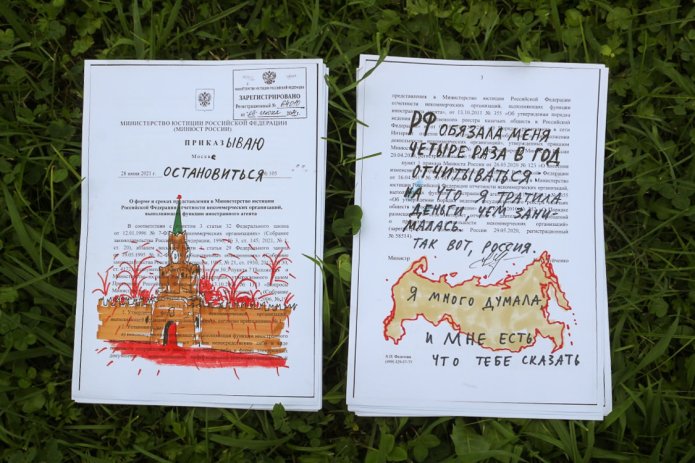
«Undesirable Organisations»

In September we learned that the Uralic Center for the Development of Indigenous Peoples (Estonia) and the Free Buryatia Foundation (USA) were recognized as «undesirable» organizations at the end of August. In September several organizations were proclaimed «undesirable»: the International Transport Workers Foundation (UK), EastCham Finland (Finland), the Hudson Institute, the Foundation for Democratic Development (USA) and the non-profit organization Unkremlin (Germany).
Saratov journalist Alexander Nikishin was fined for collaborating with the «Golos» movement, which was previously part of the «undesirable» European Network of Election Monitoring Organizations (ENEMO). Co-chair of the movement, Grigory Melkonyants, was sent to pre-trial detention in August over the organisation of ENEMO’s activities in Russia, even though «Golos» had ceased cooperation with this organisation.
A criminal case under the article on «undesirable» organisations was initiated against former State Duma deputy Ilya Ponomarev. This is likely related to his leadership of the «Congress of People’s Deputies», which was declared «undesirable» in April.
Freedom of Speech
Cases on Calls for Terrorism or Extremism
Azat Miftakhov, a mathematician who was released from a penal colony in September, was sent to pre-trial detention on charges of «justifying terrorism». He had been free for less than half an hour. The activist is accused of approving an attack on the Arkhangelsk (a major city in Northwest Russia) Federal Security Service building. Also, due to persecution under this article, anti-war blogger Nikolay Farafonov from Vuktyl (a town in the Komi Republic) was taken into custody.
Journalist Ayder Muzhdabaev was sentenced in absentia to six years in a penal colony for calls made in 2018 to «forcibly capture Russian agents» and exchange them for Ukrainian filmmaker Oleg Sentsov, who was then serving a sentence in a Russian penal colony and was on a hunger strike. A resident of Kansk (a town in Krasnoyarsk Krai, Siberia) was sentenced to seven years in a penal colony for statements about explosions on the Crimean bridge.
Cases on «Rehabilitation of Nazism» and Damage to Symbols

In Prokopyevsk (Kemerovo region), a criminal case was opened over the rehabilitation of Nazism against a man who allegedly wrote «RDK» (short for Russian Volunteer Corps) on a monument to miners killed in World War II.
Prison sentences under this article were handed to a resident of Komi who put an inscription on the Eternal Flame Memorial; to a resident of Cheboksary who «insulted» members of the Immortal Regiment; a resident of Abakan who discussed the Second World War on VKontakte; and to a resident of Yoshkar-Ola who «walked about» the Eternal Flame. Sergei Volkov, resident of Ivanovo, was fined 2 million rubles (~US$20,000) for voicing his opinion that Stalin had «abandoned» Stalingrad.
Insulting the «Religious Feelings»
Trash blogger Stasik Kudryavy (Stanislav Bazarov) who urinated on the icon was sent to compulsory treatment.
Chechen leader Ramzan Kadyrov posted a video of his 15-year-old son Adam Kadyrov beating Nikita Zhuravel, a courier from Volgograd. Zhuravel was put in a pre-trial detention centre as a suspect of «insulting the feelings of believers» because of a video of him burning the Quran.
Freedom of Assembly
Detentions at Rallies and Their Consequences
Besides anti-war actions, detentions took place in September during gatherings and pickets on environmental protection, those in support of Nikita Zhuravel who had been beaten up in a pre-trial detention centre by Ramzan Kadyrov’s son, and during other actions. A young woman calling for solidarity with the residents of Artsakh (Nagorno-Karabakh) was detained near the Armenian Embassy in Moscow.
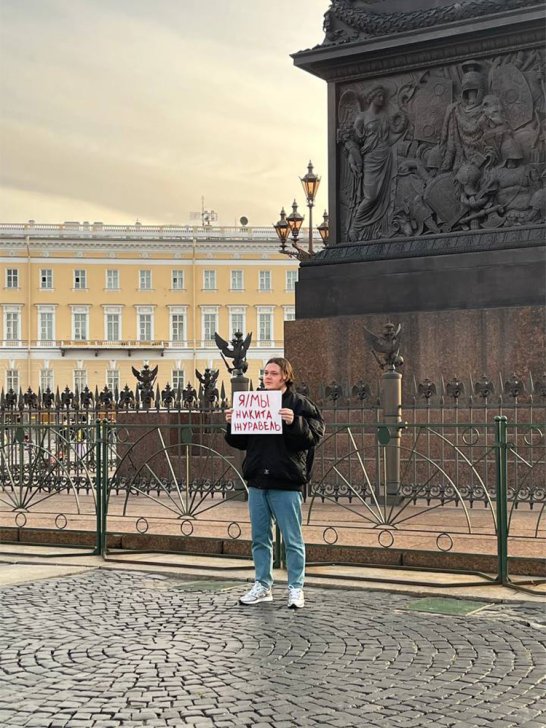
Refusals to Authorize Rallies and Disruption of Events
In September, the Cheboksary authorities did not authorise the events prepared by the Yabloko Party and by the Communist Party; a resident of Elista was fined for announcing a rally that did not take place. Memorial was denied the right to hold its annual event commemorating victims of repression. The authorities hindered a protest of defrauded shareholders in Vladimir, an environmental action in the Sverdlovsk region; and in Novosibirsk, independent candidate Anton Kartavin was not authorised to organise a meeting with voters. Later, he managed to challenge this decision in court.
Pressure Related to Elections

During the regional elections, unknown individuals assaulted a Communist Party campaigner in Ivanovo. After being detained at a polling station, Moscow resident Alfia Salahova required hospitalisation due to injuries to her cervical vertebrae. She claimed that policemen dragged her through the police station. In the Moscow suburb of Mytishchi, a Communist Party observer had tar poured into the lock of her door.
In Gelendzhik, two election observers were served with military summons right at the polling station. Novgorod candidates from the Yabloko party, Victor Shalyakin, Anna, and Ksenia Cherepanovs, were detained and fined 4,000 rubles (~US$40) for observing polling stations open at night.
Pressure on the LGBTQ Community
In Sochi, the police arrested and issued citations for «promoting non-traditional relationships» to two friends who kissed on a park bench. One of the girls was also detained for three days for resisting police.
The comedy «Kandidat» in Yakutsk (a major city in east Siberia) was denied a screening certificate due to scenes in which a man wears women’s clothing and a wig. Teacher Artur Morozov was forced to resign from a Surgut school for allegedly wearing female clothing to work.
Other Forms of Pressure on the Civil Society
Persecution of Journalists and Human Rights Activists
Dagestani journalist Abdulmumin Gadzhiev was sentenced to 17 years in prison. Two other individuals involved in the case, Abubakar Rizvanov and Kemal Tambiev, received sentences of 17.5 and 18 years, respectively. The editor-in-chief of the independent Ivanovo publication «Rumours and Facts, » Alexey Mashkevich, was sentenced to 120 hours of community service in a libel case against the judge.
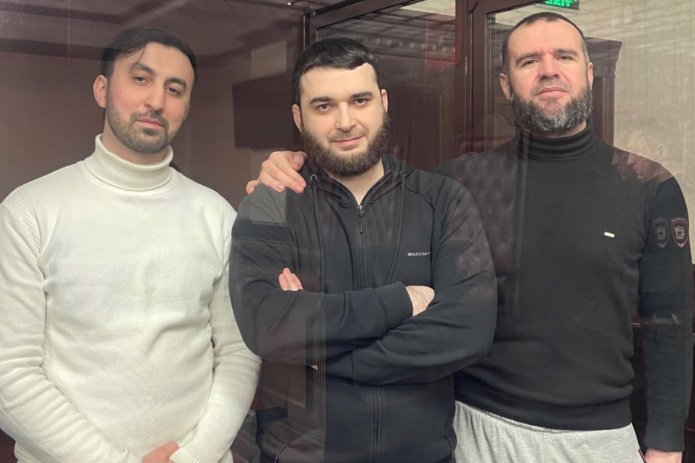
In September, it became known about the threats faced by the female journalists of «Important Stories» and human rights activist Maria Chashchilova, who had left Russia. Human rights activist Tatiana Solomina reported that her client’s family from Chechnya threatened to harm her and her 13-year-old son, and the Investigative Committee did not initiate an investigation based on the woman’s complaint.
In Khakassia, the local publication «New Focus» was liquidated; its editor, Mikhail Afanasyev, had previously been sentenced to five and a half years in prison for spreading «fake news» about the military.
In St. Petersburg, the police detained journalist Anastasia Sokolenko-Kalinina of the «Ladoga.ru» publication, accusing her of disobeying law enforcement and drug use.
Pressure on Activists and Politicians
Actionist Pavel Krisevich, who shot himself in the head with a blank cartridge on Red Square, was resentenced to five years in prison after an appeal.
Journalist and politician Vladimir Kara-Murza has been transferred to Colony No. 6 in the Omsk region (southwestern Siberia), where he has been placed in a punishment cell (SHIZO) twice in a row. In the meantime, Alexei Navalny was placed in SHIZO for the 20th time, and afterwards, he was placed in the Federal Penitentiary Service’s Special Establishment for Holding Detainees (EPKT). The court recognized the placements of Azat Miftakhov in SHIZO at the end of his sentence in the Kirov colony as legal.
In September, there were at least six searches conducted in five regions of Russia in connection with the donations to the Anti-Corruption Foundation (FBK). At least three persons were placed in custody: Gleb Kalinichev in Nizhny Novgorod (a major city in western Russia), Ilya Startsev in Orel (also western Russia), and Anton Kovrik in Omsk (southwestern Siberia). In Moscow, the defendants in the case of Navalny’s underground headquarters, Ivan Trofimov and Alina Olekhnovich, have had their house arrest replaced by a pre-trial detention centre (SIZO).
In Dagestan, hearings in the case against the former head of the local Navalny headquarters, Edward Atayev, have been suspended while his statement regarding torture is being considered. In Ufa (Bashkortostan), journalist Olga Komleva from RusNews was once again charged to pay for police officers’ overtime during rallies in support of Alexei Navalny in January 2021.
Ibragim Kartoev, a participant in the 2019 rallies in Ingushetia, has been placed under house arrest and is being charged with dangerous violence against a police officer. Alexander Cherepanov, a communist from Tyumen (southwestern Siberia), was fined five thousand rubles again in the case of assaulting a police officer during the anniversary of the October Revolution in 2020.
The defendant in the «Tyumen case, » Kirill Brik, entered into a plea deal with the investigation; the support group claims that he was forced to do so by torture.
«Extremist Organisations»
In September, the movement Novoe Vilichie (New Greatness) was declared an extremist organisation, and the persecution of its members began as early as 2018 in Moscow. All those sentenced to actual prison terms in connection with this movement have already served their sentences. Additionally, in September it was reported that in August, the Supreme Court of Kalmykia issued a similar decision regarding the Congress of Oirat-Kalmyk People.
Alexander Serebryakov, a Jehovah’s Witness from Moscow, who had already received a suspended sentence, has been sent to a pre-trial detention centre (SIZO) on new charges related to financing extremism. As part of this case, there have been at least 10 searches conducted in Moscow and the Moscow region. Another representative of the same faith was arrested in Karachay-Cherkessia.
Jehovah’s Witnesses in the Amur region, Kazan (Tatarstan), and Adygea have been sentenced to actual prison terms of up to 6 years and 1 month. Among them are elderly people with severe chronic illnesses. In the Vladimir region, a religious person was sentenced to one year of actual imprisonment, but they had already served the sentence by the time of the verdict. Three men in Tatarstan and three women in the Amur region were sentenced to suspended sentences.
Maxim Beltikov and Aleksander Nikolaev have been released from the penal colonies, while Rustam Seidkuliev, who had previously served his sentence and had been deprived of Russian citizenship, has been deported to Turkmenistan.
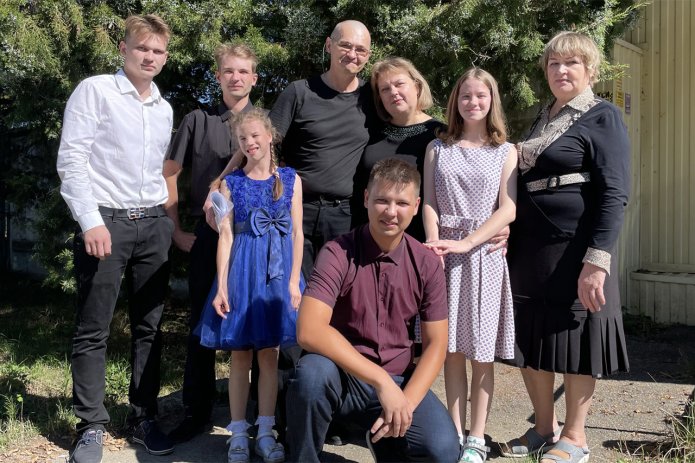
Criminal cases for the involvement in «Citizens of the USSR» were initiated in Karachay-Cherkessia, Chuvashia, Khanty-Mansiysk Autonomous Okrug, and Bryansk. One «citizen of the USSR», a case against whom was opened back in August, was also detained in Chuvashia. At least six people, including two senior citizens over 70, were sent to a pre-trial detention centre. In the Rostov region, the case against six defendants was brought to the court.
Two women, alleged by the security forces to be organisers of the «National Union for the Revival of Russia» and associated with the banned party «Volya» led by Svetlana Lada-Rus, were detained in Komsomolsk-on-Amur.
Repressions on the Territory of the Annexed Crimea
Six defendants in the new Crimean cases for the involvement in the Hizb ut-Tahrir movement were kept in handcuffs, in a half-bent position with their eyes closed and their heads pressed to their knees for approximately five hours by the FSB. Crimean Tatars continue to report witness badgering in Simferopol pre-trial detention centre No. 2.
Crimean Muslims Arsen Abkhairov and Eskender Abdulganiev, who were sentenced to serve part of their term in prison, spent more time in prison conditions than originally assigned, as the time spent in pre-trial detention was not initially credited towards their prison term. In turn, Remzi Bekirov was able to secure the correct recalculation of his term of imprisonment.
Convicted defendants in the Crimean Hizb ut-Tahrir cases continue to face denial of medical care. After his transfer to the Yelets prison, Vladlen Abdulkadyrov’s back pain intensified. Azamat Eyupov, who survived four mini-strokes, is not prescribed any treatment in the Verkhneuralsk prison (west central Russia).
In the Stavropol Krai penal colony, the health of Crimean activist Irina Danilovich, who was sentenced to a lengthy term for possession of explosives, also continues to deteriorate — she experiences partial hearing loss and suffers from severe headaches and ear pain.



